Garage rock is a raw and energetic style of rock music that flourished in the mid-1960s, most notably in the United States and Canada, and has experienced a series of subsequent revivals. The style is characterized by basic chord structures played on electric guitars and other instruments, sometimes distorted through a fuzzbox, as well as often unsophisticated and occasionally aggressive lyrics and delivery. Its name derives from the perception that groups were often made up of young amateurs who rehearsed in the family garage, although many were professional.

Nuggets: Original Artyfacts from the First Psychedelic Era is a compilation album of American psychedelic and garage rock singles that were released during the mid-to-late 1960s. It was created by Lenny Kaye, who was a writer and clerk at the Village Oldies record shop in New York. He would later become the lead guitarist for the Patti Smith Group. Kaye produced Nuggets under the supervision of Elektra Records founder Jac Holzman. Kaye conceived the project as a series of roughly eight LP installments focusing on different US regions, but Elektra convinced him that one double album would be more commercially viable. It was released on LP by Elektra in 1972 with liner notes by Kaye that contained one of the first uses of the term "punk rock". It was reissued with a new cover design by Sire Records in 1976. In the 1980s, Rhino Records issued Nuggets in a series of fifteen installments, and in 1998 as a 4-cd box set.

Acid rock is a loosely defined type of rock music that evolved out of the mid-1960s garage punk movement and helped launch the psychedelic subculture. While the term has sometimes been used interchangeably with "psychedelic rock", acid rock also specifically refers to a more musically intense, rawer, or heavier subgenre or sibling of psychedelic rock. Named after lysergic acid diethylamide (LSD), the style is generally defined by heavy, distorted guitars and often contains lyrics with drug references and long improvised jams.

The Music Machine was an American rock band formed in Los Angeles, California in 1966. Fronted by chief songwriter and lead vocalist Sean Bonniwell, the band cultivated a characteristically dark and rebellious image reflected in an untamed musical approach. Sometimes it made use of distorted guitar lines and hallucinogenic organ parts, punctuated by Bonniwell's distinctively throaty vocals. Although they managed to attain national chart success only briefly with two singles, the Music Machine is today considered by many critics to be one of the groundbreaking acts of the 1960s. Their style is now recognized as a pioneering force in proto-punk; yet within a relatively short period of time, they began to employ more complex lyrical and instrumental arrangements that went beyond the typical garage band format.

Pebbles, Volume 3, subtitled The Acid Gallery, is a compilation album featuring American underground psychedelic rock musical artists from the 1960s. It is the third installment of the Pebbles series and was released on BFD Records in 1979. The album is marked for containing among the most unusual recordings of psychedelic music.
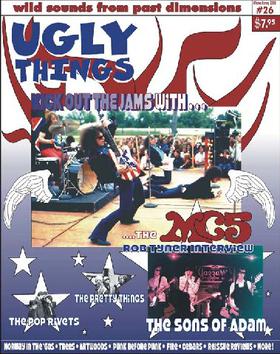
Ugly Things (UT) is a music magazine established in 1983, based in La Mesa, California. The editor is Mike Stax. The magazine covers mainly 1960s Beat, garage rock, and psychedelic music. The name Ugly Things is a pun that refers to the band The Pretty Things.
The Mystic Tide were an American rock band who have been credited for creating some of the first psychedelic anthems. Despite their lack of commercial success, they are now highly regarded amongst followers of garage rock and are recognized for their innovative musical approach.

The Savages were a garage rock band from Bermuda that were active in the mid-1960s. They are best remembered for their album, Live 'n Wild, which was composed largely of self-penned tunes and recorded in front of a live audience, has been mentioned as a seminal work in the genre, and features the song, "The World Ain't Round It's Square". This song has become regarded as a classic 1960s anthem of youthful defiance.

Live 'N Wild is a live album released in 1966 by The Savages, a garage rock band from Bermuda, which was recorded live at the Hub, a nightclub at the Princess Hotel in their native country. Consisting of mostly self-composed songs, the album is considered a seminal work in the garage rock genre, and features the song, "The World Ain't Round It's Square," which has come to be regarded as a classic '60s anthem of youthful defiance.
The Bees was an American garage rock and psychedelic band from Covina, California, that was active in the mid-1960s, and was best known for the 1966 paranoiac anthem "Voices Green and Purple". The song has been mentioned as an innovative example of early protopunk.
The Brigands were an American garage rock act who are best known for the 1966 song, "(Would I Still Be) Her Big Man", which appeared as the A-side of a single released on Epic Records. Little is known about them other than that the song was recorded in New York City. Their origins are unknown, but some have attributed their residence to Forest Hills, Long Island, New York. Others have speculated that they were an ensemble of session musicians who recorded the song as a one-time act under the moniker "the Brigands." One reason mentioned by exponents of this hypothesis is that there would be more known about them, if they had indeed been an actual performing unit. They point out that there are no printed artifacts available, such as flyers and listings of live performances, records of battles of the bands, and newspaper clippings. They also point out that, since the song was released on Epic Records and produced by Artie and Kris Resnick, who wrote the Young Rascals' "Good Lovin'" and other popular hits of the time, it is unlikely that such an unknown band would have received the attention of such well-known and established fixtures, unless the song had been recorded by a "ghost band" of session musicians under their tutelage.
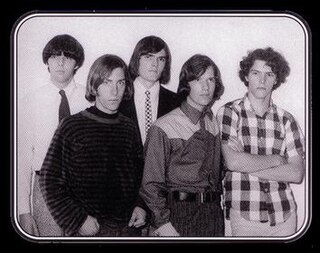
Harbinger Complex was an American garage rock/psychedelic rock band from Fremont, California, who were active in the mid-1960s. In the years since their breakup, their work has come to the attention of garage rock fans and collectors and has appeared on several retrospective compilations including the Nuggets 4-CD box set. They are best-remembered for their 1966 song, "I Think I'm Down."
The Humane Society were an American garage rock band from Simi Valley, California who were active from 1965 through 1968, who are best known for their 1967 protopunk anthem, "Knock Knock."
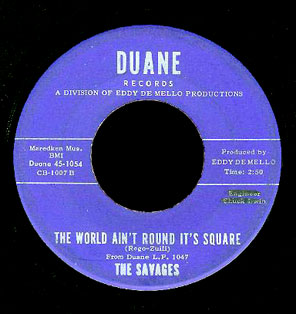
"The World Ain't Round It's Square" is a song recorded in 1966 by The Savages, a garage rock band from Bermuda and was written by Howie Rego and Bobby Zuill. It was recorded live at the Hub, a nightclub at the Princess Hotel in Bermuda and appeared on their live album taped from the event, Live 'n Wild. The song has been mentioned as a landmark anthem of 1960s youthful defiance and is ranked #4 in the list of the 1000 greatest garage rock records in Mike Markesich's Teenbeat Mayhem. It has been featured on the Teenage Shutdown! The World Ain't Round, It's Square! compilation as well as included the reissue of Live 'n Wild.
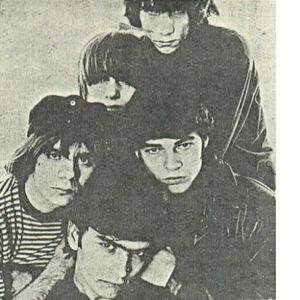
The Groupies were an American garage rock-psychedelic rock band from New York City who were active in the 1960s and are known for an innovative approach to primal blues-based rock exemplified in such songs as "Primitive". They were a popular fixture in the New York club scene and recorded for Atco Records, later venturing to Los Angeles. Due to their uncompromising stance the Groupies failed to attract a wider audience outside of their local enclaves. They have come to the attention of garage rock and psychedelic enthusiasts and their work has been included on various compilations such as the 1998 Nuggets four-CD box set, which was released on Rhino Records. Their material has been re-issued on other garage rock and psychedelic compilations such as the Pebbles, Volume 10 LP.
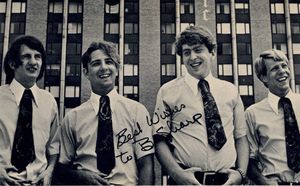
T.C. Atlantic was an American garage rock/psychedelic rock band from Minneapolis, Minnesota who were active in the 1960s. They were one of the most popular groups in the Twin Cities, but failed to break nationally. In the intervening years since their breakup, their recordings have attracted the interest of '60s music collectors and enthusiasts, and they are particularly remembered for their 1966 fuzz-tinged song, "Faces", which has been mentioned as one of the earliest garage rock songs to display psychedelic characteristics.

The David was an American garage rock/psychedelic rock band from Los Angeles, in southern California who were active in the 1960s and early 1970s. They are known for songs such as "40 Miles," which became a minor hit in Bakersfield. They began with a basic garage approach but later expanded their creative palette to incorporate esoteric and baroque elements on the 1967 album, Another Day, Another Lifetime. They continued for a few more years but disbanded in the early 1970s.

The Underdogs were an American garage rock band from Grosse Pointe, Michigan who were active in the 1960s. They became a regular attraction at the Hideout, a club that was an early venue for acts such as Bob Seger, Glenn Frey, and The Pleasure Seekers, featuring Suzi Quatro, and it also served as the home to the Hideout record label, which released several of the Underdogs' singles. The group enjoyed success in the region and came close to breaking nationally with two records released through a joint deal on Reprise Records and then their last on Motown. The Underdogs' work has been included on various garage rock compilations such as the 1998 Nuggets 4-CD box set released on Rhino Records.

The Escapades were an American garage rock band from Memphis, Tennessee who were active in the 1960s. They became one of the most popular groups in the Memphis area during the mid-1960s and recorded two singles. "I Tell No Lies", the A-side of their debut single, became a big hit in Memphis and around the South. They were signed to Verve Records, who released their follow-up, "Mad, Mad, Mad", which featured a fuzz-toned guitar line. Their work is highly regarded by garage rock enthusiasts and collectors and has appeared on various compilations.

The Oxford Circle was an American garage rock and psychedelic rock band from Davis, California, near Sacramento, who were active from 1964 to 1967. They became a popular garage rock act with a proto-punk sound influenced by Them and other blues-based bands of the British Invasion, that, in addition to heavy guitar feedback, came to encompass psychedelia. The group began to make appearances in San Francisco, where they became a top draw in venues such as the Avalon Ballroom. They taped a show at the Avalon in 1966 and, after lying in the vaults for years, it was rereleased in 1997 on the Nuggets from California: Live at the Avalon 1966 anthology. In 1967, they released the single, "Foolish Woman" b/w "Mind Destruction", which is also included, along with several other studio outtakes, on the Nuggets from California compilation. In 1967, drummer Paul Whaley left to play in pioneering heavy rock act Blue Cheer. Lead vocalist and guitarist Gary Lee Yoder and bassist Dehner Patten left to form Kak, who recorded for Epic Records. Yoder subsequently went on to join Blue Cheer in one of their later configurations.















